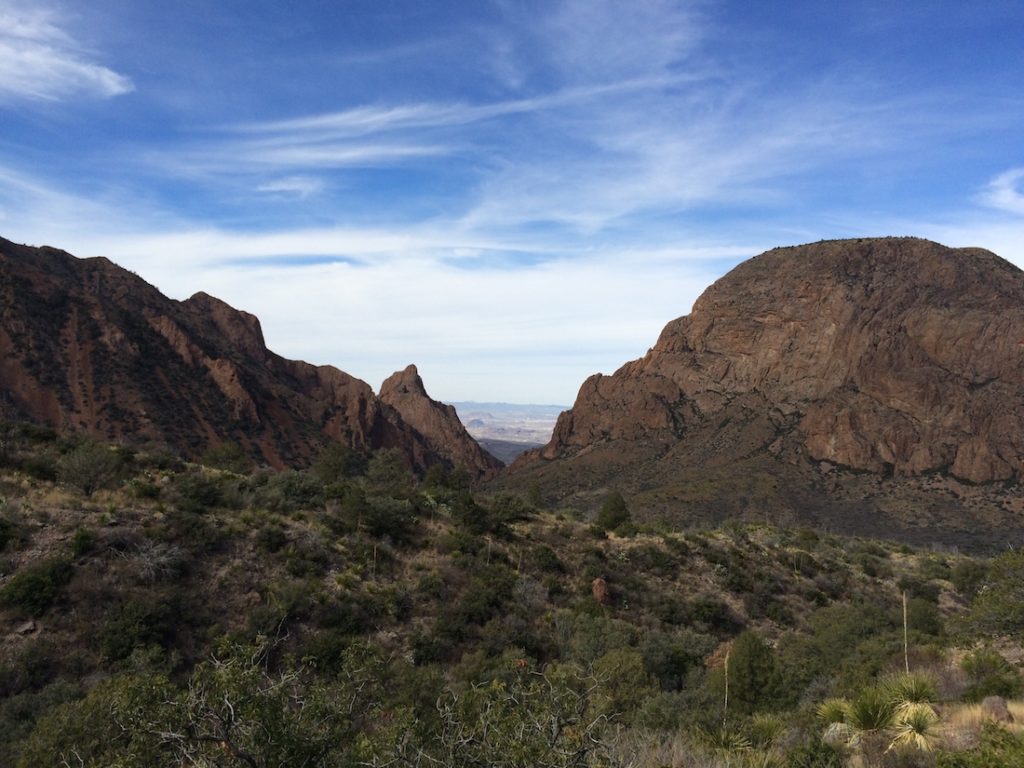
Big Bend National Park protects a chuck of the West Texas desert where the road ends at the Mexican border. The skies are as large as the horizon, and after the sun sets, the night sky glitters brighter than anywhere else in the U.S. People come to Big Bend to get away, and it feels like that way. Everything operates on West Texas time, and it is slower. Big Bend visitors can appreciate the desert landscape on a scenic drive, on a hike or paddling down the river. It’s where the desert meets the mountains and then meets the river. A favorite among National Park travelers, its remote beauty puts it on top of their list. Here are the top things to do in Big Bend.
15 Top Things to Do in Big Bend
-
Visit One of the Visitor Centers
-
See Chisos Mountains
-
Stop by the Castolon Historic District
-
Gaze at the Santa Elena Canyon
-
Walk around Rio Grande Village and Hot Springs
-
Stop by the Fossil Discovery Exhibit
-
Take Scenic Drives in Big Bend
-
Take a Hike in Big Bend
-
Bike on Big Bend’s Roads
-
Take a River Trip in Big Bend
-
See Big Bend’s Animals
-
See Wildflowers in Big Bend
-
Gaze up at Big Bend’s Night Skies
-
Earn a Junior Ranger Badge in Big Bend
-
Go Camping
Big Bend At a Glance
| Year Established: 1935 |
| Located: At the Bend in West Texas |
| Size: over 1,200 square miles |
| Top Features: Desert vistas, Mountain range and the End of the Road vibe |
For first-time visitors, Big Bend National Park’s size can be overwhelming. It’s one of the largest parks in the lower 48 and protects the Chisos Mountains and the Chihuahuan desert in West Texas.
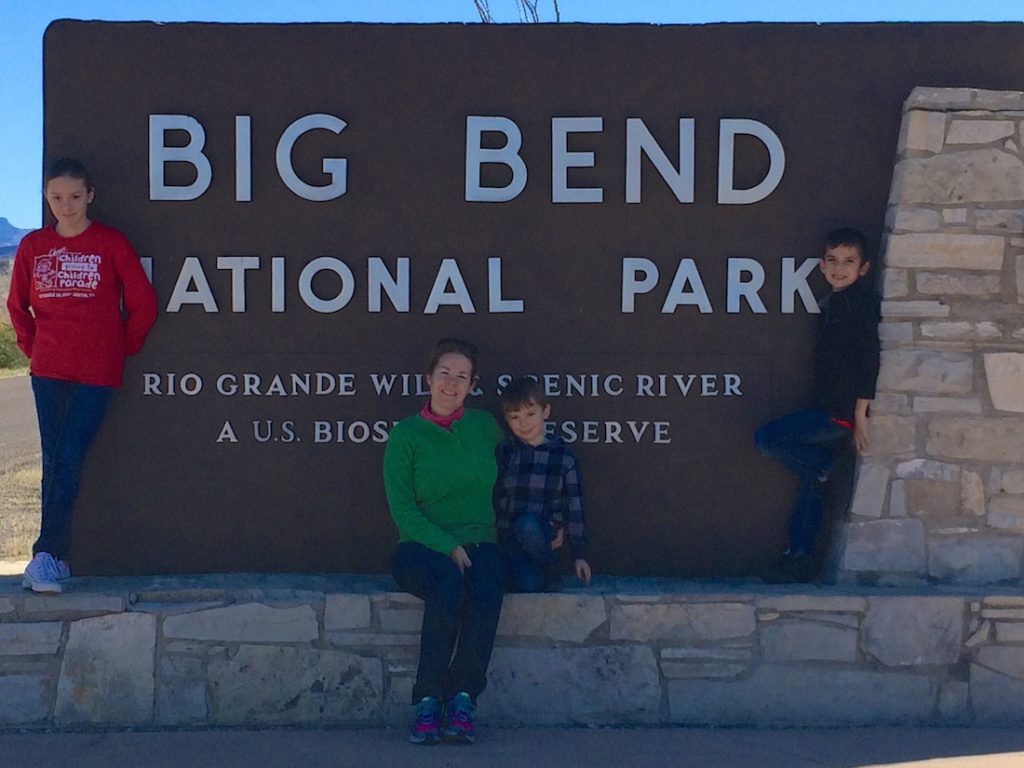
Visit the Visitor Centers in Big Bend National Park
From maps to Junior Ranger booklets, an NPS visitor center is the place for information, along with restrooms and hydration stations. It is also where permits are obtained, like backcountry permits. Some visitor centers offer interpretive areas, a short movie, and demonstration gardens showcasing native plants.
Park rangers are stationed at the visitor centers for help. They are packed with park information, like where to spot animals or the best hiking trails for your group.
Panther Junction Visitor Center
Centrally located in the center of the park, the Panther Junction Visitor Center features a theater showing an introductory film to Big Bend National Park, the Panther Junction Visitor Center is the main visitor in the park. It offers an interpretive area, a gift shop and a U.S. Post Office.
Visitors will find Wi-Fi and cellular service near the visitor center. Outside, there are picnic tables. A gas station is located in the area, though it can run out during the busy seasons.
Located at 1 Panther Junction. Open daily from 8:30 a.m. – 5 p.m. year-round.
Persimmon Gap Visitor Center
This is the first visitor center most visitors see at Big Bend National Park’s main entrance. It offers a small theater, bookstore, gift shop, and interpretive areas.
Outside there are picnic tables. River permits are issued at the Persimmon Gap Visitor Center.
Located at the north entrance of the park. Open daily from 10 a.m. to 4 p.m.
Chisos Basin Visitor Center
The Chisos Basin Visitor Center, located in the Chisos Mountains and near the Chisos Mountain Lodge, offers an interpretive area with animals from Big Bend National Park.
Located at 142 Chisos Basin Rd. Open daily from 8:30 a.m. – 4 p.m.
Castolon Visitor Center
Only open during the winter season, it is located in the Castolon Historic District.
Located at 600 Ross Maxwell Scenic Dr. Open from 10 a.m. – 4 p.m. from November to April.
Rio Grande Village Visitor Center
This visitor center offers an interpretive area covering the Rio Grande, the river that divides Texas and Mexico. It is located at the end of the road and is the closest visitor center to Boquillas del Carmen.
Located at 450 Rio Grande Rd. Open from November until end of May from 9 a.m. – 4:30 p.m.
Caves Tours Across Texas
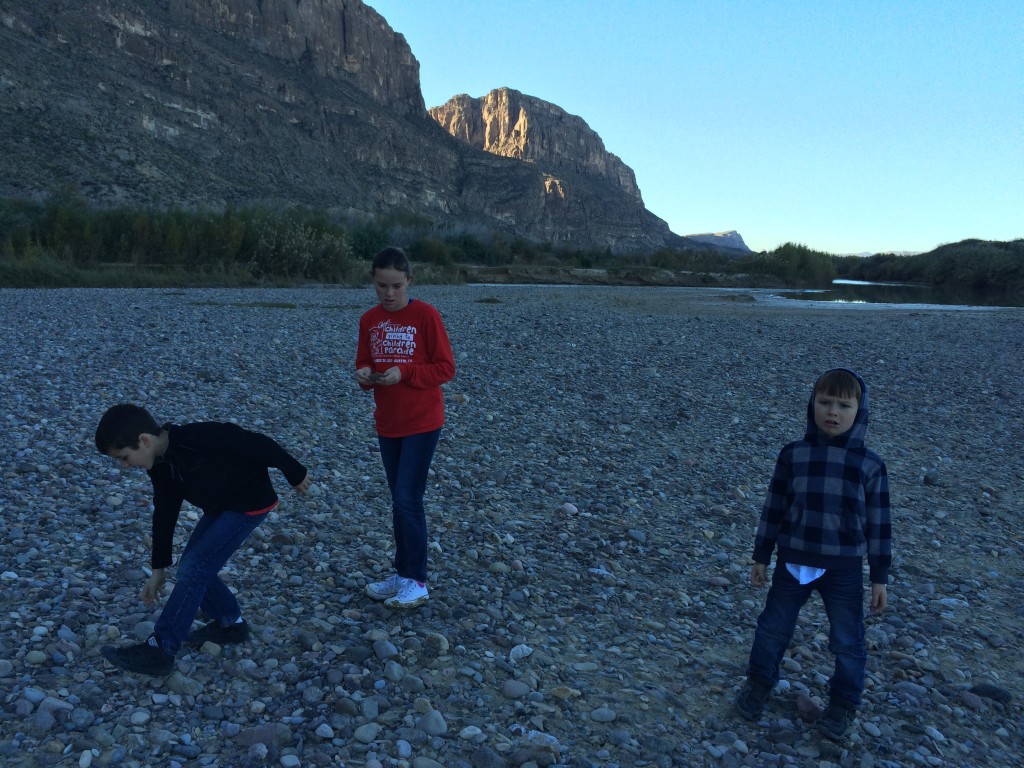
See the Chisos Mountains and Basin
Home to the highest peaks in Big Bend National Park: Emory Peak (7,835 feet) and Lost Mine Peak (7,535 feet). The entire Chisos mountain chain is located in the park. A seven-mile road snakes up to the Chisos Basin and visitors will find a visitor center along with a lodge with dining (the only one in the park).
With its higher elevation, it is cooler during the day and colder at night, thanks to the thin desert air. One of its top trails is the Window Trail, which ventures out to the rock formation that frames the desert below.
Stop by the Castolon Historic District
This area was used for farming in the 1900s since it offered water along with fertile soil. In the early 1900s, a store opened to serve the farmers along with the miners in Terlingua.
Now, the area offers historic buildings and is a frequent stopping point for those driving onto Santa Elena Canyon.
Gaze at the Santa Elena Canyon
Santa Elena Canyon offers the most dramatic scenery of the Rio Grande. Its limestone canyon walls, up to 1,500 feet tall, are the tallest in this section of the river. It is a popular pull-out for river trips.
The best way to enjoy a day on the Rio Grande is to take a guided river trip.
Walk Through the Rio Grande Village and Hot Springs
Located in a pocket of Cottonwoods, the Rio Grande Village offers a large campground area along with a picnic area. The U.S. – Mexico Border Crossing is in the area. The Daniels Ranch, a historic adobe building, is also in the area.
Langford Hot Spring is along the edges of the Rio Grande. To reach the hot springs, visitors must drive down a two-mile unpaved road and hike .25 miles to the foundation of the original bathhouse. The water is 105 degrees F and a popular destination for soaking.
Stop at the Fossil Discovery Exhibit
Visitors can learn about the dinosaurs from 130 million years ago at the Fossil Discovery Exhibit, an interpretive area. In addition to the display, there is a picnic area and a vault toilet in the area.
Located 8 miles south of the Persimmon Gap Entrance. Open from dawn to dusk.
Dugout Wells
This area was once the hub of activity and the home of a schoolhouse. It is a good area for picnics and offers vault toilets.
Top Things to Do in Fredericksburg
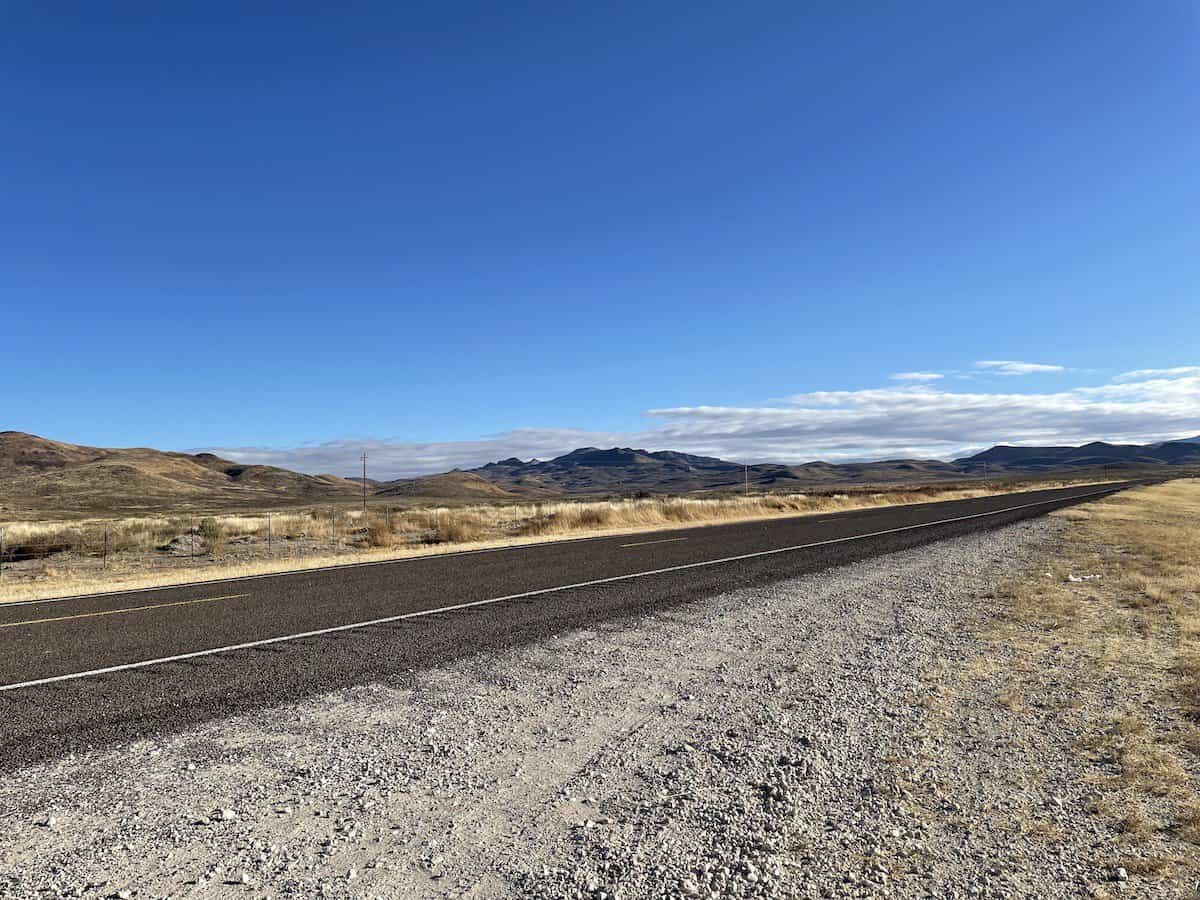
Fun Things to Do in Big Bend National Park
The best way to see a national park is to explore a national park. From scenic drives to hiking to kayaking, there is a lot of things to do in Big Bend.
Take Scenic Drives in Big Bend
Just by driving from one place to another, visitors are doing one of the top acitivities in Big Bend National Park.
Chisos Basin Road
This 6-mile road twists and turns into the Chisos Mountains. As it climbs over 2,000 feet, drivers get epic views of Big Bend. The Civilian Conservation Corps constructed it in the 1930s.
It is not recommended for trailers over 20 feet or RVS over 24 feet.
Ross Maxwell Scenic River
A 30-mile road offers areas like Sotol Vista, Mules Ear Overlook and the Castolon Historic District. The road ends at the magnificent Santa Elena Canyon.
Persimmon Gap to Panther Junction
The 28-mile route from the Big Bend entrance at U.S. Route 385 to Panther Junction features the Fossil Discovery Exhibit and the trails Dog Canyon and Devil’s Den.
Maverick Entrance Station to Panther Junction
From the western entrance, this 23-mile road is the central road in Big Bend National Park.
Top National Parks in Texas
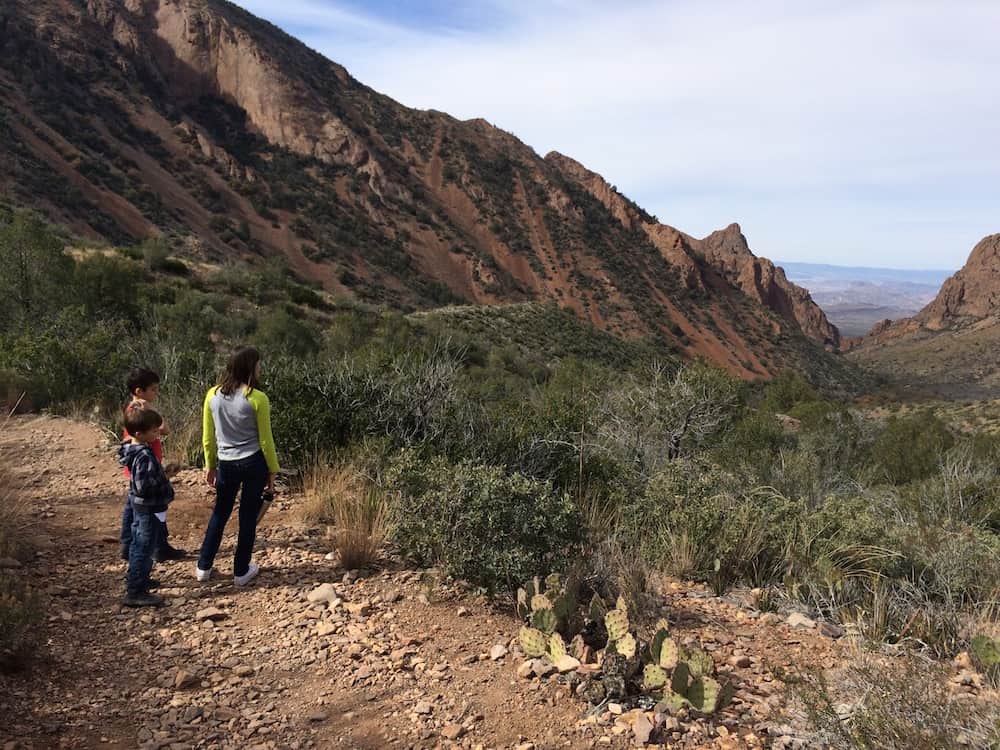
Take a Hike in Big Bend
A hike in Big Bend is one of the top activities in the park. With different regions to explore, each is unique regardless of location, and carry water while hiking.
Chisos Mountain Hiking Trails
With its higher elevations and tree coverage, the Chisos Mountains are a popular destination for hiking in Big Bend National Park.
Window View Trail—A .3-mile paved and accessible path that goes to the viewpoint of the famed Window formation. Good for most, including strollers.
Chisos Basin Trail—This 1.8-mile roundtrip trail traverses the basin. It’s a moderate trail, though my school-age kid hiked it.
Window Trail—A 5.6-mile roundtrip trail to the window that overlooks the desert below. It is rated a moderate trail.
Rio Grande Hiking Trails
The Rio Grande offers hiking trails that combine scenery along with birding, as many are found near the water source.
Rio Grande Village Nature Trail—A .75-mile easy loop includes a boardwalk, and part of it is accessible.
Hot Springs Historic Trail—A 1-mile easy loop that passes the 105-degree Fahrenheit hot springs popular for soaking. There are pictographs along this hiking trail.
Boquillas Canyon Trail—A 1.4-mile roundtrip trail labeled moderate.
Santa Elena Canyon Trail—A 1.7-mile moderate trail through the dramatic scenery of Santa Elena Canyon. It can be muddy.
Desert Hiking Trails
Panther Path—A 50-yard fully accessible loop at the Panther Junction Visitor Center with a labeled cactus garden.
Chihuahuan Desert Nature Trail—This .5-mile roundtrip around the Dugout Wells area is a good picnic spot.
Lone Mountain Trail—This 2.7-mile trail is rated easy, so it’s good for hikers who want a longer distance in easy terrain.
Lower Burro Mesa Pour-Off Trail—A 1.0-mile easy trail to a 100-foot pour-off in the rock.
Bike on Big Bend’s Roads
With over 100 miles of paved roads and 160 miles of backcountry roads, Big Bend is a destination for cycling. Bikes are allowed on roads, though not on hiking trails, and e-bikes are welcome.
In Big Bend, the most scenic routes are best enjoyed if you have a shuttle vehicle. Big Bend doesn’t offer a park shuttle, like some other national parks.
Panther Junction to Rio Grande Village—A 20-mile one-way trip on the paved park road that heads downhill most of the way.
Old Maverick Road—A one-way 13-mile unpaved road that’s rated easy and ends at Santa Elena Canyon.
Dagger Flat Auto Trail—An 18-mile roundtrip trip on an unpaved road.
Longer routes are available for more experienced riders.
Top Things to Do in Fort Davis Texas
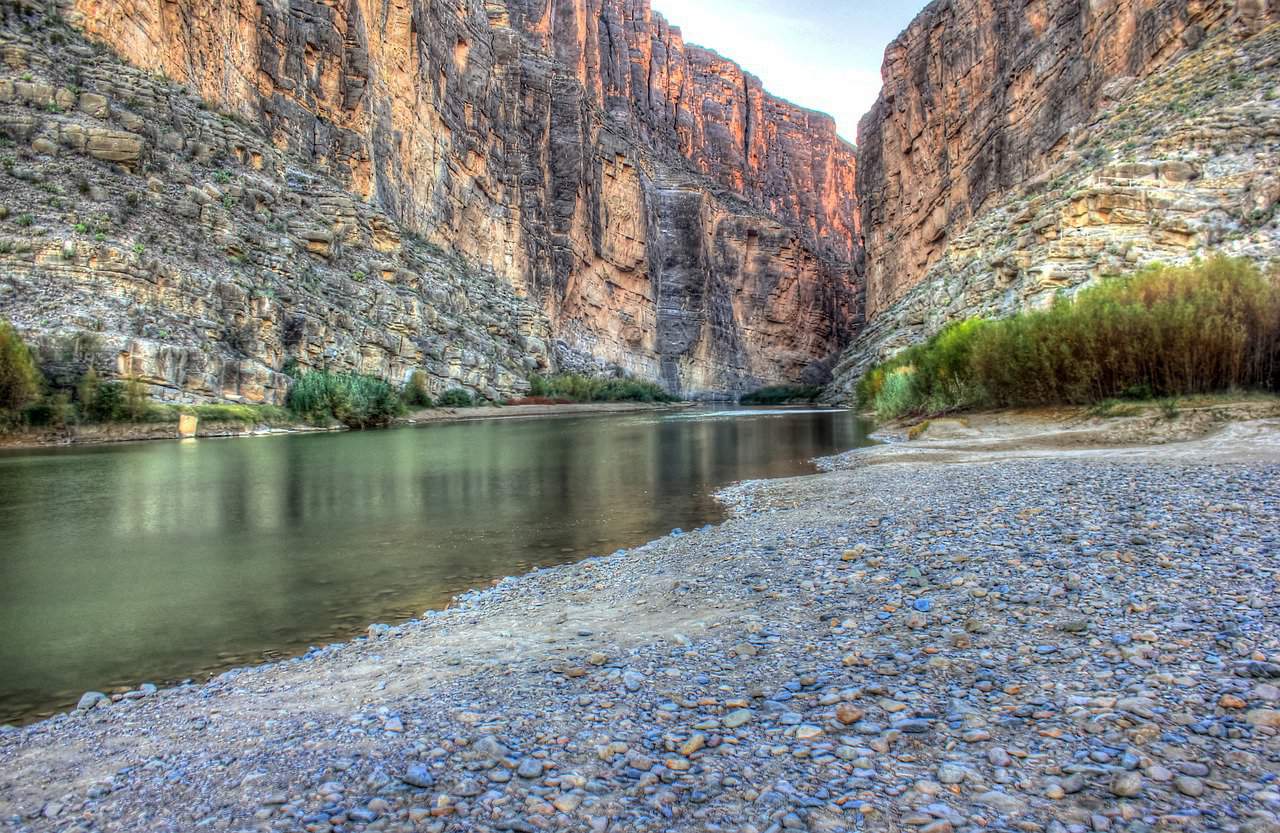
Take a River Trip in Big Bend
The canyons along the Rio Grande, like the Santa Elena Canyon, are best viewed from the water. River trips are popular activities, and there are several put-ins at various locations in the park for those who bring gear.
It is an international border, so it is illegal to cross into Mexico. Overnight trips require a backcountry permit and proper planning.
For visitors who want a shorter trip to West Texas without lugging gear, several outfitters in the area offer trips. They rent gear and also offer guided trips, from afternoon kayak floats to multi-day canyon canoe trips with camping.
See Big Bend’s Animals
The animals in Big Bend like to snooze during the heat of the day, so dusk and dawn are the best for animal viewing. In the Chisos Mountain Basin, Mexican black bear and mountain lions are found.
Smaller mammals, such as jackrabbits, coyotes, and squirrels, can be easily spotted along the roadways of Big Bend. At nighttime, bats might be spotted along with the Javalina or Collared Peccary, especially near water sources.
- Mule Deer and Carmen White-tail Deer, the smallest species in Texas
- Mountain Lions—also called cougars, puma or panthers
- Bobcat
- Gray Fox
- Ringtail, a relative of the raccoon
- Badger
- Desert Big Horn Sheep
- Aoudad, an invasive exotic sheep from North Africa.
- Nutria, an invasive
- Elk, introduced into the park by the NPS
Birding in Big Bend
Over 450 different types of birds can be found in the park, thanks to the migration route to warmer Mexico. Big Bend offers trees, supported by an oasis.
The best place to see birds in the park is by water, especially the Rio Grande. Another spot is the Chisos Mountain Basin, which offers trees along with cooler temperatures. The Cottonwood Campground is another birding hot spot.
Horseback Riding in Big Bend
Horses are allowed in Big Bend, and horseback riding is permitted on the gravel roads within the park. A backcountry permit is required, and horse owners must bring vaccination records. Owners must also be prepared for their trip with feed and water containers since water isn’t reliable in the park.
The primitive campsites at the Hannold Draw site offer a corral for visitors who want to camp with their stock.
See Wildflowers in Big Bend
For the flower lovers, blooms come early to Big Bend. For the Texas State Flower, the Bluebonnet, visitors should visit in late February and through March. The cactus blooms later, with its showy flowers coming in April and May. Smaller yellow wildflowers will bloom in May and June, especially after summertime monsoons.
Winter is the peak season in Big Bend due to its pleasant daytime temperatures and sunny skies. It is also the dry season for the Chihuahua desert, though if it rains during the winter, a superbloom might occur afterward.
Best Places to Find Wildflowers in Texas
Gaze Up at Big Bend’s Night Skies
Big Bend is an International Dark Sky Park. Due to its remote location, it offers the darkest park skies in the Lower 48. Visitors can see the Milky Way at Big Bend, and the night skies are part of the majestic scenery of the Big Bend.
Ranger programming dedicated to the night skies is available, scheduled according to the moon phase. Visitors should consult the park calendar for ranger programming.

What to do with Kids in Big Bend
The Junior Ranger Program is the go-to program for families to learn more about a National Park Service site. It’s free and takes about two hours to complete. My kids love the badges the Rangers present them with after they complete their booklet.
Big Bend offers ranger programming just for kids. Ranger Bob’s Panther Path Parade is one of those programs where kids can earn a special patch, the Panth
Top National Park Books for Kids
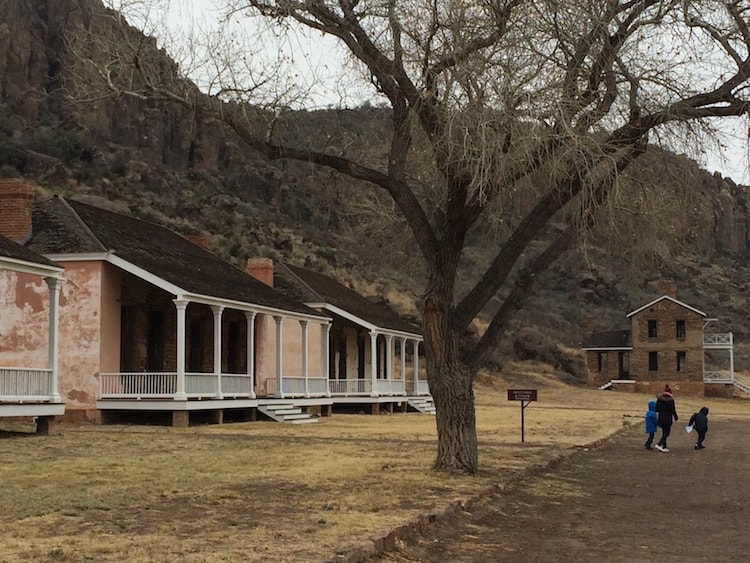
Nearby Sites to Explore
Big Bend National Park is at the end of the road, so it’s a destination in its own right. Travelers can add a few stops and attractions along the way.
Balmorhea, right off Interstate 10, is a must for late spring, summer and early fall visits since it’s home to the largest spring-fed pool in Texas at Balmorhea State Park.
Fort Davis offers a National Park Service site dedicated to preserving its West Texas fort. It is also home to the Davis Mountains State Park with the famed Indian Lodge.
Marfa is a West Texas Art town and offers several galleries to explore along with The Hotel Paisano.
The towns of Terlingua and Marathon offer limited services outside of businesses that cater to tourists. Both offer lodging, dining, and gas.
Guide to Fort Davis in West Texas
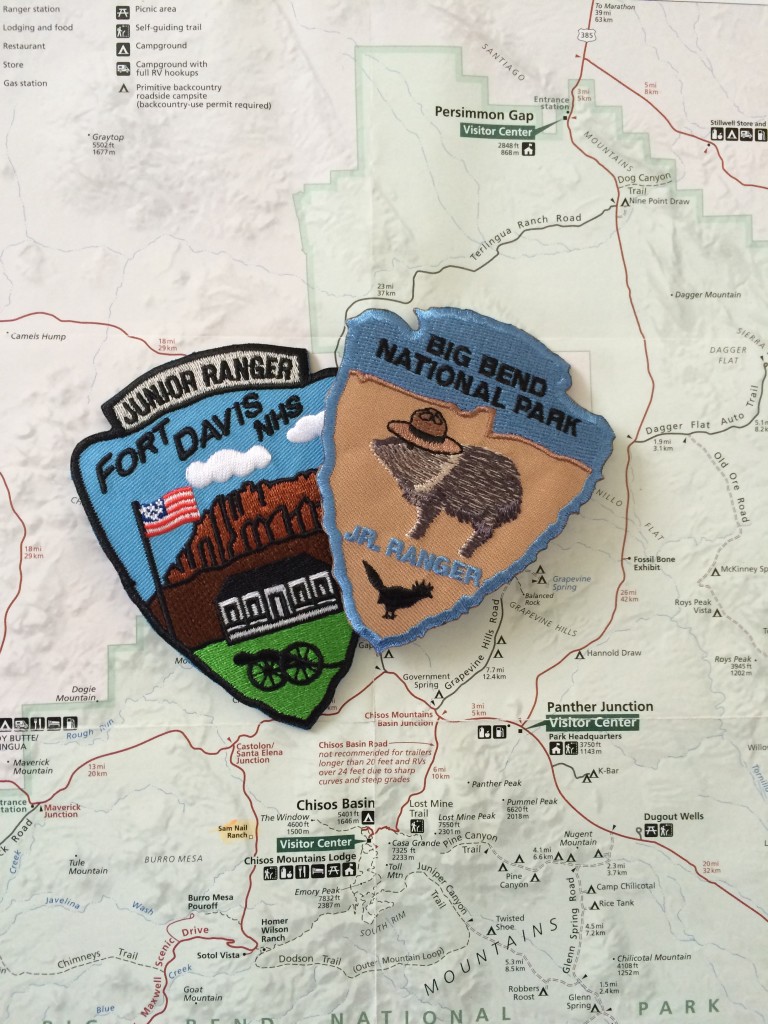
Where to Stay in Big Bend
Chisos Mountain Lodge
As the only lodging within Big Bend National Park, the Chisos Mountain Lodge offers views of the mountains and is close to some of the top hiking trails. The lodge dining room serves breakfast, lunch and dinner.
The Chisos Mountain Lodge features 72 rooms, each with a mini-fridge and microwave.
Camping in Big Bend National Park
Note: Wood and ground fires are not allowed inside Big Bend National Park. However, charcoal fires in an above-ground grill and camp stoves are allowed.
Chisos Basin Campground
- Year-round
- Reservations required
- 56 sites with a Dump Station
- Potable water and flush toilets
- No showers
- Trailers over 20 feet and RVs over 24 feet are not allowed
Rio Grande Village Campground
- Year-round
- Reservations required
- 93 sites with a Dump Station
- Potable water and flush toilets
- Showers
Cottonwood Campground
- Year-round
- Reservations required
- 22 sites
- Potable water and vault toilets
- No showers
Rio Grande RV Campground
- Year-round
- Reservations required
- 25 sites, no tents
- Potable water and flush toilets
- Showers
How Long to Spend in Big Bend
One-Day Trip to Big Bend
Visitors can drive through on one day but might regret their lack of time (especially counting how long it took to get to Bend Bend. If one day is all there is, then enter at one entrance and depart from the other.
The Ross Maxwell Scenic Drive to Santa Elena Canyon is one of the top places to see in Big Bend. Also, a visit to the Chisos Basin offers a different landscape to explore.
Both areas offer shorter hikes along with visitor centers (restrooms and water available) in the area. For a one-day trip, preparation is key, so pack water, snacks and picnic meals.
Three-Day Trip to Big Bend
Ideally, a three-day trip to Big Bend will allow visitors to see the park. One day for each area of the park is ideal: Castolon (Santa Elena Canyon), Chisos Mountain, and the Rio Grande Village.
Visitors can add a river trip down the Rio Grande, a day trip into Boquillas, Mexico, or an extended hike. For trips into Boquillas, a valid passport is required.
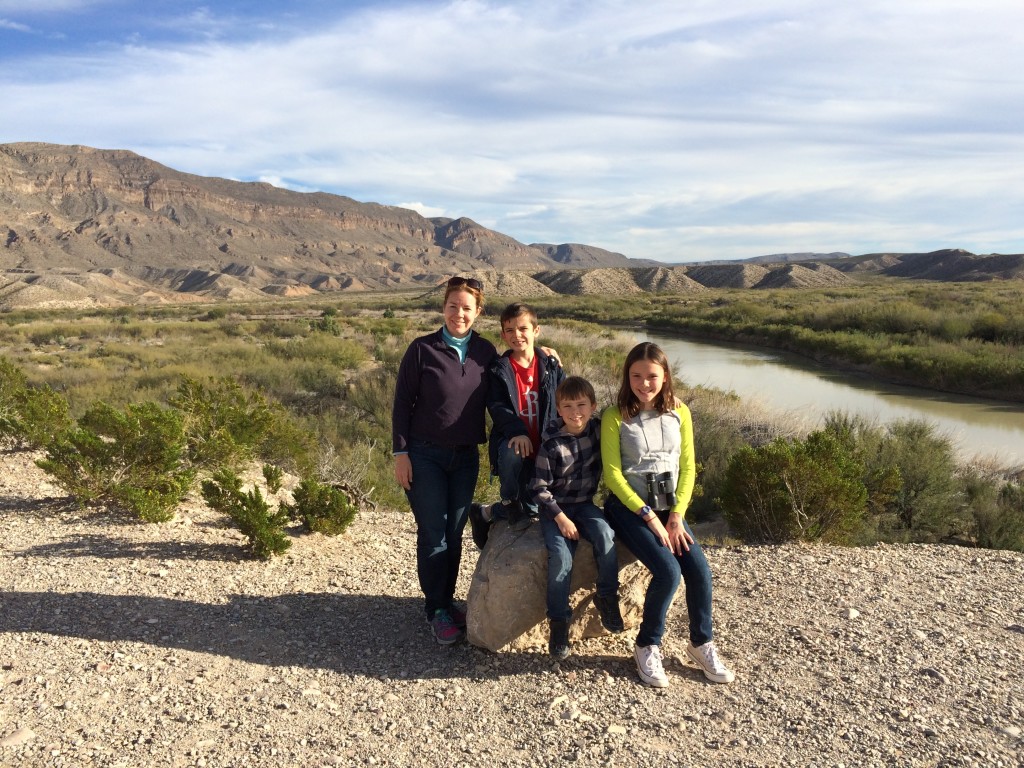
My Trip to Big Bend National Park with Kids
For our trip, we traveled over Christmas Break, settling on the week before December 25. This is high season for the area so make lodging reservations in the Fall, as early as possible. We stayed just outside of the park in Terlingua, an old mining town that’s got a quirky vibe.
Our lodging had outdoor grills so I took advantage of that and planned to grill off burgers for dinner. This worked well for my group and since West Texas is a ways from everything, I bought everything I needed. With basic cooking supplies, a cooler and a stocked picnic bag, I kept everyone fed and happy.
Remember the marshmallows. Ground fires are usually not allowed in the arid West, though our lodge featured a gas-powered campfire. Roasting marshmallows under the night sky was amazing.
During the day, we explored and did some short hikes, each at Santa Elena Canyon, Chisos Basin and the Rio Grande Village area. I advise visitors to start the day in the Chisos Basin area since parking is at a premium and fills. The late afternoon light was beautiful at Santa Elena.
For those who want to venture into Mexico, a valid passport book or passport card is required for all visitors. On our visit, the border was closed. It is open Wednesday thorugh Sunday during the winter and Friday to Monday during the summer.
Since I was visiting in the winter, the deer population was very active at night. I took extra care when driving at night, and my passenger helped by animal-spotting so I could focus on the road. In addition to deer, we saw several Javalina along the road.
How to Get to Big Bend
Big Bend National Park is open every day, all day. The 7-day vehicle pass is $30. Visitors can purchase an annual America the Beautiful Pass for $80 to gain entry into the majority of the national parks and monuments for one year.
Reservations are not required to enter Big Bend National Park. It doesn’t restrict visitors or vehicles into the park.
Big Bend National Park is about 450 miles from San Antonio, Texas.
It features two entrances. One is along Texas Highway 118 at Maverick Junction. This entrance is closest to Terlingua and Alpine, farther north. Alpine has an Amtrak and Greyhound station.
The other entrance near Persimmon Gap uses U.S. Highway 385, close to Marathon, Texas. There is no public transportation into the park, and Big Bend National Park doesn’t currently offer shuttle buses.
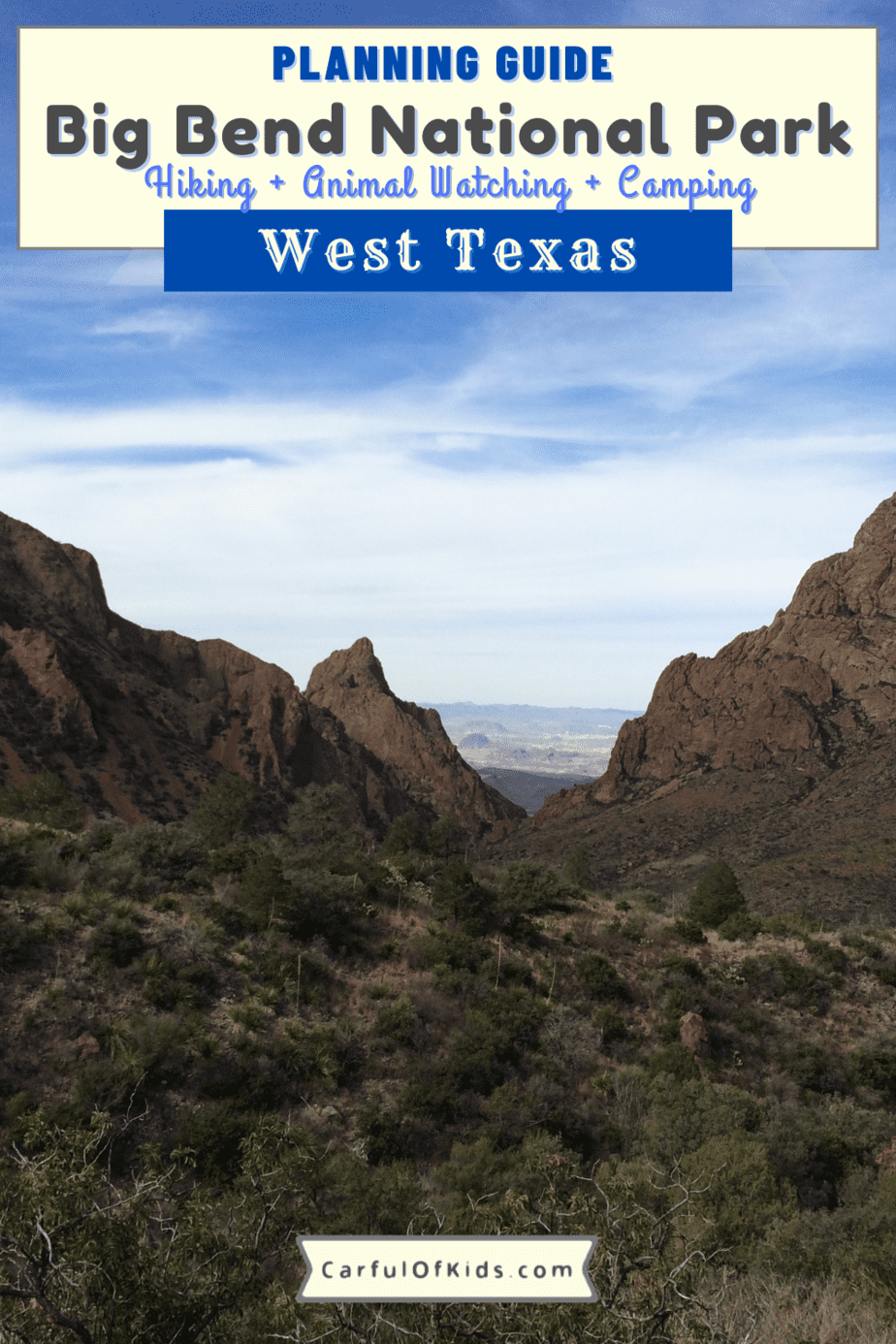

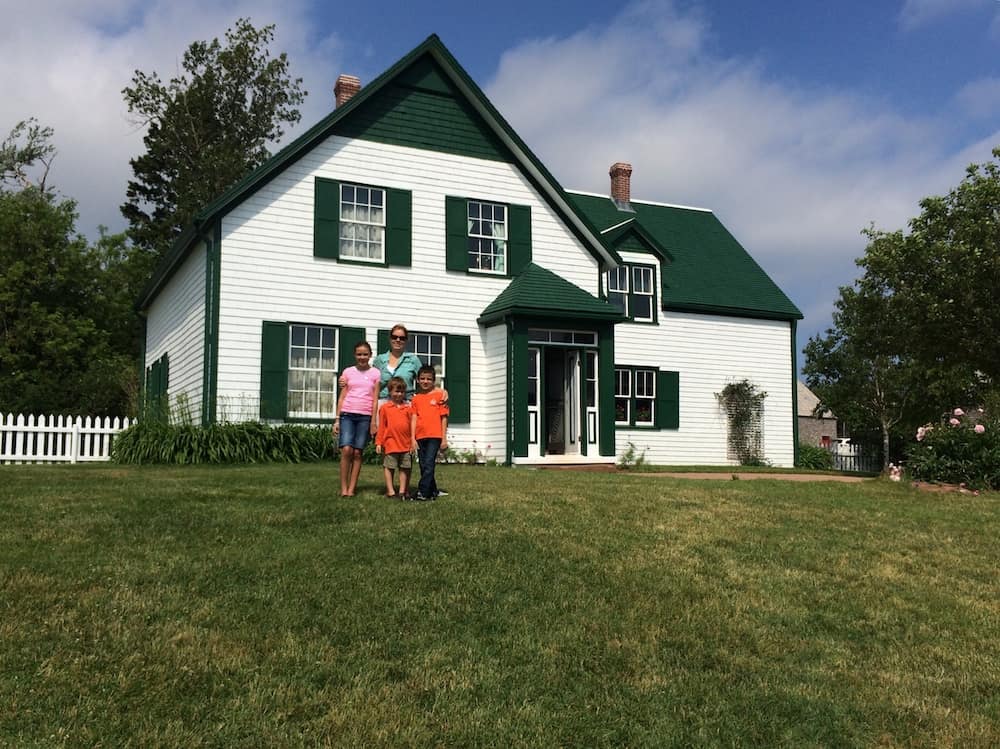
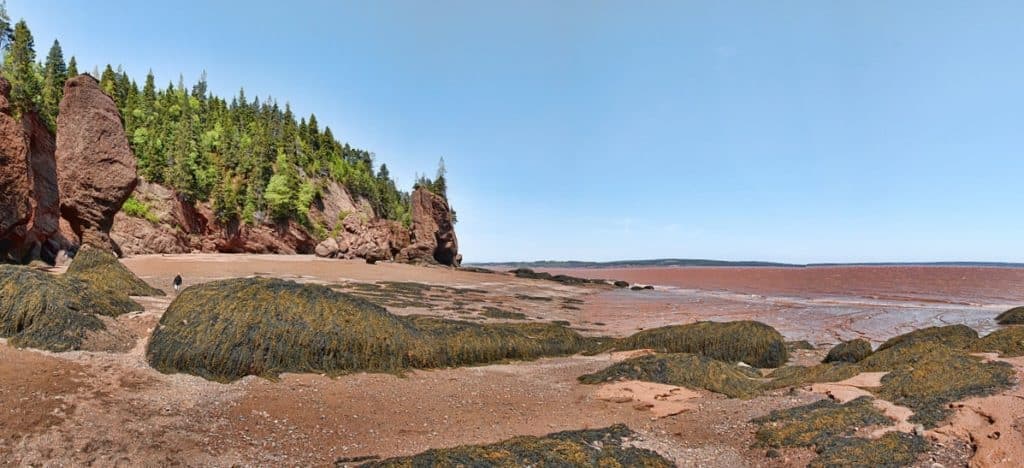
Comments are closed.